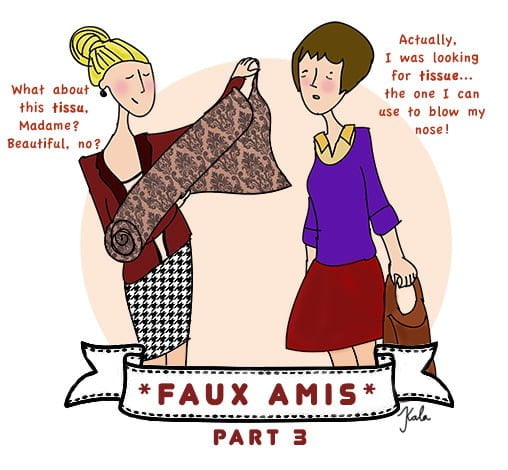Good Friends are Hard to Come by
Chances are good that if you are reading this blog at all, at one time or other you have made the mistake of using a “false friend”. Even if you have yet to acquire that new language you’ve had your eye on for a while, believe me, it’s only a matter of time before a false friend rears its ugly—albeit at times hilarious—head.
For those not in the know, words in different languages (or dialects) are referred to as false friends when they look or sound similar, but differ greatly in meaning. Not to be confused—though they often are—with false cognates which are words that are close in meaning and appearance so it seems as if they have similar roots when, in fact, they do not. So, back to false friends: imagine you think you’ve become familiar with a new language, gotten to know it and its quirks. You think the two of you get along quite well. That is, until your new language thinks you’re a bit too full of yourself. And like a mean teenaged girl, it makes you feel comfortable and important until it’s ready to strike. That’s when a false friend makes its appearance. The next thing you know, you’re trying to tell someone how embarrassed you are in Spanish and inadvertently say you’re pregnant instead. Saying “embarazada” when you mean to say “avergonzada” is like adding fuel to the embarrassment fire.

The best thing to do in this situation, as in most situations where one has made a fool of one’s self, is to laugh it off. Don’t let your insecurities get the best of you, because this happens all the time, everywhere, in practically every language. I, personally, used to do this often when speaking Spanish as a child.Now, I can laugh about these things, and I sometimes do it on purpose for fun, like weird Spanglish puns. My favorite is to say, “I’m going to the farmer’s market for some groserías.” If you didn’t speak Spanish, you’d think I was talking about groceries, right? Wrong, groserías means profanities or vulgarities (neither of which can be found at my local farmer’s market, in case you were wondering).
This brings up another reason to have a good sense of humor when approaching a new language: if you are very unlucky—like me—you will somehow manage to test the limits of propriety with your gaffes. A good example is when a friend of mine, who happens to be very health conscious, asked her French host family if there were a lot of preservatives in her food. Unfortunately she used the false friend (this one is so bad it might as well be called a frenemy) préservatif, which changed her question considerably. Préservatif, she later found out, means contraceptive.

These things can happen in different versions of the same language as well. While working in a non-profit thrift store as a teenager, I was asked by the British boss for a “rubber.” While I was caught between wanting to laugh and wanting to call the police, he looked in a desk drawer and proclaimed: “Never mind, I found one,” while holding out what I know to be called an eraser. Potential crisis averted. When encountering these situations, it is important to note that actions speak louder than awkwardly incorrect words. So I did what I suggested to you, I laughed. Then I explained the slip-up, and laughed some more. After all, what’s the harm of a few false friends between a pair of real ones?
Has anything like this happened to you? Please share — embarrassment loves company, after all.
